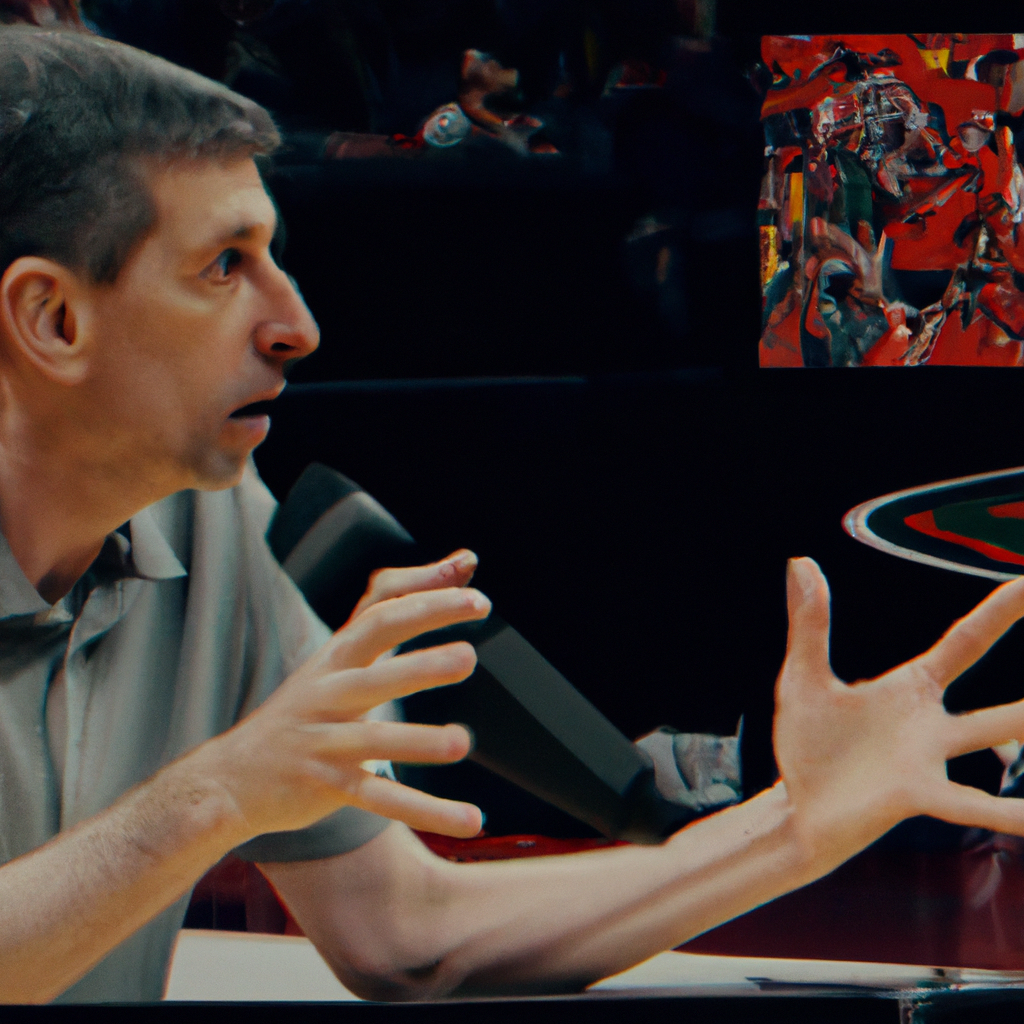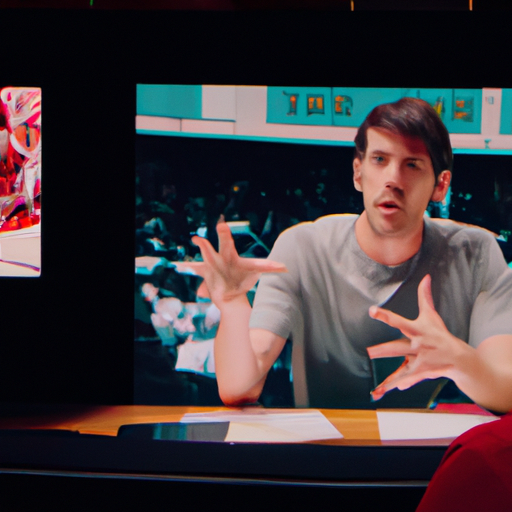Kevin McHale explains seeing James Harden’s offensive game become one-dimensional with Rockets

Analyzing Kevin McHale’s perspective on James Harden’s one-dimensional offensive game with the Rockets
Kevin McHale, former head coach of the Houston Rockets, recently shared his perspective on James Harden’s offensive game during his time with the team. McHale, who coached Harden for four seasons, believes that the superstar’s offensive approach became one-dimensional, limiting the team’s overall success.
According to McHale, Harden’s offensive game initially showcased a diverse skill set that made him a formidable force on the court. He possessed the ability to score from anywhere on the floor, whether it be driving to the basket, shooting mid-range jumpers, or knocking down three-pointers. This versatility made him a nightmare for opposing defenses, as they struggled to contain his scoring prowess.
However, as time went on, McHale noticed a shift in Harden’s offensive approach. He became heavily reliant on his step-back three-point shot, often neglecting other aspects of his game. While this move became Harden’s signature move and a lethal weapon in his arsenal, it also made him predictable and easier to defend.
McHale believes that this one-dimensional offensive game hindered the Rockets’ chances of winning a championship. Opposing teams began to devise defensive strategies specifically tailored to neutralize Harden’s step-back three-pointer. They would double-team him, force him to give up the ball, or deny him the space needed to execute his signature move. As a result, the Rockets’ offense became stagnant and predictable, lacking the necessary creativity and versatility to overcome these defensive schemes.
Furthermore, McHale argues that Harden’s reliance on isolation plays also contributed to the team’s offensive limitations. While Harden’s isolation skills are undoubtedly impressive, they often led to a lack of ball movement and player involvement. This isolation-heavy style of play made it easier for opposing defenses to key in on Harden and disrupt the flow of the Rockets’ offense.
McHale suggests that for the Rockets to reach their full potential, Harden needed to diversify his offensive game. He needed to incorporate more off-ball movement, set screens, and involve his teammates in the offense. By doing so, he would not only make himself a more difficult player to defend but also create opportunities for his teammates to contribute and thrive.
It is worth noting that McHale’s analysis is not meant to diminish Harden’s incredible offensive abilities. He acknowledges that Harden is one of the most talented scorers in the league and has achieved remarkable individual success. However, McHale believes that for the Rockets to become true championship contenders, Harden’s offensive game needed to evolve beyond its one-dimensional nature.
In conclusion, Kevin McHale’s perspective on James Harden’s offensive game with the Houston Rockets sheds light on the limitations that arose from his one-dimensional approach. While Harden’s step-back three-pointer and isolation skills are undoubtedly impressive, they also made him predictable and easier to defend. McHale suggests that for the Rockets to reach their full potential, Harden needed to diversify his offensive game and involve his teammates more. Only then could the team overcome the defensive strategies designed to neutralize his scoring prowess and become true championship contenders.
The impact of James Harden’s offensive style on team dynamics and overall performance

Kevin McHale, former head coach of the Houston Rockets, recently shed some light on James Harden’s offensive game and how it became one-dimensional during his time with the team. McHale’s insights provide a valuable perspective on the impact of Harden’s style on team dynamics and overall performance.
According to McHale, Harden’s offensive game initially brought a lot of success to the Rockets. His ability to draw fouls and get to the free-throw line was unmatched, and he consistently put up impressive scoring numbers. However, as time went on, McHale noticed a shift in Harden’s approach.
Harden began relying heavily on isolation plays, often dribbling the ball for long periods and taking contested shots. While he was undoubtedly talented enough to make these shots, McHale believed that this style of play had a negative impact on the team’s overall performance.
One of the main issues McHale identified was the lack of ball movement. With Harden dominating the ball, other players on the team had fewer opportunities to contribute offensively. This led to a stagnant offense that was easy for opposing teams to defend against.
Furthermore, McHale argued that Harden’s style of play created a lack of trust among his teammates. When one player dominates the ball to such an extent, it can breed resentment and frustration among the rest of the team. This can have a detrimental effect on team chemistry and ultimately hinder performance on the court.
McHale also pointed out that Harden’s offensive game became predictable. Opposing teams knew that he would often look to drive to the basket or take a step-back three-pointer. As a result, they were able to devise defensive strategies specifically tailored to stop him. This made it increasingly difficult for Harden to find success and limited his effectiveness as a scorer.
In addition to these issues, McHale highlighted the toll that Harden’s style of play took on his own energy levels. Constantly having to create offense for himself and carry the team’s scoring load can be physically and mentally draining. This could explain why Harden’s performance often dipped in crucial moments of playoff games.
McHale’s observations provide valuable insights into the impact of Harden’s offensive style on team dynamics and overall performance. While Harden’s individual brilliance cannot be denied, it is clear that his one-dimensional approach had its drawbacks.
Moving forward, it will be interesting to see how Harden’s offensive game evolves with his new team, the Brooklyn Nets. Playing alongside other star players like Kevin Durant and Kyrie Irving may force him to adapt his style and become a more well-rounded offensive player.
Ultimately, the success of the Nets will depend on their ability to find a balance between individual brilliance and team cohesion. If Harden can find a way to incorporate his scoring prowess while also involving his teammates and creating a more dynamic offense, the Nets could become a formidable force in the NBA.
Exploring alternative strategies for James Harden to diversify his offensive game and improve team success
Kevin McHale, former coach of the Houston Rockets, recently spoke out about James Harden’s offensive game becoming one-dimensional. McHale, who coached Harden during his time with the Rockets, expressed his concerns about the team’s over-reliance on Harden’s isolation plays and lack of diversity in their offensive strategies.
According to McHale, while Harden is undoubtedly one of the most talented offensive players in the league, his style of play has become predictable and easy to defend against. Opposing teams have figured out how to neutralize Harden’s isolation plays, often double-teaming him and forcing him to give up the ball. This has resulted in the Rockets struggling to find alternative scoring options and has ultimately hindered their overall team success.
To address this issue, McHale suggests that Harden needs to diversify his offensive game and become a more well-rounded player. One possible strategy is for Harden to focus on improving his off-ball movement and cutting to the basket. By doing so, he can create scoring opportunities not only for himself but also for his teammates. This would force opposing defenses to adjust their game plan and provide the Rockets with more offensive options.
Another alternative strategy for Harden is to develop a more consistent mid-range jump shot. Currently, Harden heavily relies on his three-point shooting and driving to the basket. While he is undoubtedly proficient in these areas, adding a reliable mid-range shot to his arsenal would make him even more difficult to defend against. It would force defenders to play him tighter, opening up opportunities for him to drive to the basket or find open teammates.
Furthermore, McHale suggests that the Rockets should implement more off-ball screens and movement to create space for Harden. By involving other players in the offensive plays, it would make it harder for opposing defenses to solely focus on stopping Harden. This would not only diversify the Rockets’ offensive game but also improve team chemistry and cohesion.
In addition to these strategies, McHale emphasizes the importance of Harden’s willingness to adapt and embrace change. It is crucial for him to recognize that his current style of play may not be sustainable in the long run. By being open to new ideas and approaches, Harden can continue to evolve as a player and elevate his team’s success.
Ultimately, the key to improving the Rockets’ offensive game and achieving greater team success lies in diversifying James Harden’s offensive strategies. By incorporating off-ball movement, developing a consistent mid-range shot, and involving other players in the offensive plays, the Rockets can become a more formidable and unpredictable team. However, it is essential for Harden to be receptive to change and willing to adapt his game. Only then can the Rockets reach their full potential and compete at the highest level.

